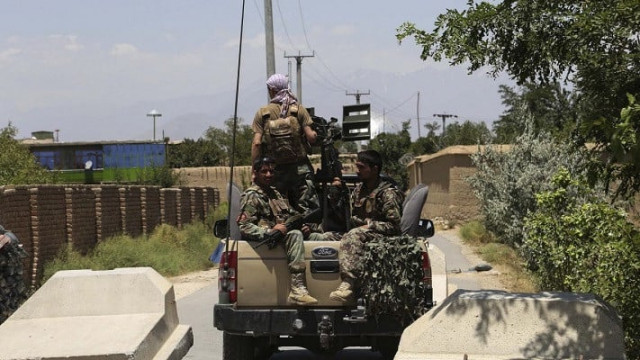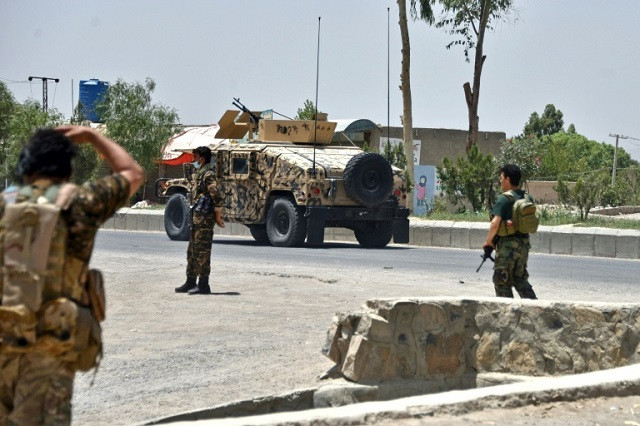Afghanistan to rush troops to border as Taliban extend gains
Taliban claim its fighters had seized two crossings in the country's west as US troops continued their withdrawal

Afghan authorities prepared Saturday to retake a key border crossing seized by the Taliban in a sweeping offensive that the insurgents claim has helped capture a vast swath of the violence-wracked nation.
As US troops continued their withdrawal, the Taliban said its fighters had seized two crossings in western Afghanistan - completing an arc of territory from the Iranian border to the frontier with China.
It now held 85 percent of the country, a Taliban official said Friday, controlling about 250 of Afghanistan's nearly 400 districts - a claim impossible to independently verify, and disputed by the government.
Read: Taliban say they control 85% of Afghan territory
Beijing, meanwhile, which has criticised Washington for its hasty withdrawal, urged its citizens to leave the country "as soon as possible" after evacuating 210 nationals.
The "complex and severe domestic security situation" prompted the evacuation warning, the foreign ministry said, adding that 22 of those flown out tested positive for coronavirus on arrival in China.
On Friday Taliban spokesperson Zabihullah Mujahid told AFP their fighters had captured the border town of Islam Qala on the Iranian frontier and the Torghundi crossing with Turkmenistan.
Herat governor spokesperson Jilani Farhad said Saturday the authorities were deploying fresh troops to retake Islam Qala post, the biggest trade crossing between Iran and Afghanistan.
"They will be sent there soon," he told AFP.

Afghan security personnel stand guard along a road in Kandahar during fighting between Afghan security forces and Taliban fighters. PHOTO: AFP
The Afghan government has repeatedly dismissed the Taliban's gains as having little strategic value, but the seizure of multiple border crossings and the taxes they generate will likely fill the group's coffers with new revenue.
With the Taliban having routed much of northern Afghanistan in recent weeks, the government holds little more than a constellation of provincial capitals that must largely be reinforced and resupplied by air.
The air force was under severe strain even before the Taliban's lightning offensive overwhelmed the government's northern and western positions, putting further pressure on the country's limited aircraft and pilots.
On Thursday President Joe Biden said the US military mission would end on August 31 - nearly 20 years after it began - but he admitted it was "highly unlikely" Kabul would be able to control the entire country.
"The status quo is not an option," Biden said of staying in the country. "I will not send another generation of Americans to war in Afghanistan."
Biden said the Afghan people alone should determine their future, but he acknowledged the uncertainty about what that would look like.
Asked if a Taliban takeover was inevitable, the president said: "No, it is not."
Afghan commandos clashed with the insurgents this week in a provincial capital for the first time, with thousands of people fleeing Qala-i-Naw in northwest Badghis province.
Read more: Taliban captured key border crossing with Iran: spokesperson
On Friday the Afghan defence ministry said government forces had "full control" of the city, but a local official said on Saturday the insurgents had attacked again during the night.
On Saturday, the Taliban also claimed to have captured a district in the province of Laghman, neighbouring Kabul.
Around 100 kilometres (60 miles) from the Iranian border, Ismail Khan - a veteran warlord whose fighters helped US forces topple the Taliban in 2001 - vowed to back government forces fighting against the insurgents.
"We will soon go to the front lines and with the help of God change the situation," Khan told reporters in the western city of Herat.
On Saturday, hundreds of Khan's fighters deployed across the city and manned its gates, an AFP correspondent reported.
The Taliban have been emboldened by the US troop withdrawal and - with peace talks in Doha deadlocked - appear to be pressing for a full military victory.
Still, on Thursday, Suhail Shaheen, a member of the Taliban negotiating team, insisted the insurgents were seeking a "negotiated settlement".
But President Ashraf Ghani said the insurgents were not interested in talks.
"When one side wants negotiations but the other side doesn't want to talk, is that right?" he said in a speech on Saturday.
US Defense Secretary Lloyd Austin called for international pressure to force a deal.
"The entire world can help by continuing this push," he said in a tweet.
The security situation in Afghanistan only argues more for international pressure to have a negotiated political settlement to end this conflict, and give the Afghan people they government they want and they deserve. The entire world can help by continuing this push. https://t.co/0D7rhUPHGT
— Secretary of Defense Lloyd J. Austin III (@SecDef) July 9, 2021
The Pentagon chief did not specify which countries he was urging to help, but Pakistan is widely believed to have significant influence over the insurgents.
Also read: Afghan forces retake provincial capital after Taliban incursion
In recent weeks China, another neighbour, has harshly criticised what it sees as a hasty and chaotic withdrawal by Washington.
"The US disregards its responsibilities and duties and withdraws troops from Afghanistan hastily, dumping the mess and war on the Afghan people and countries in the region," foreign ministry spokesperson Wang Wenbin told a routine briefing Friday.
"The US, as the original culprit of the Afghan issue, bears unavoidable responsibility."



















COMMENTS
Comments are moderated and generally will be posted if they are on-topic and not abusive.
For more information, please see our Comments FAQ